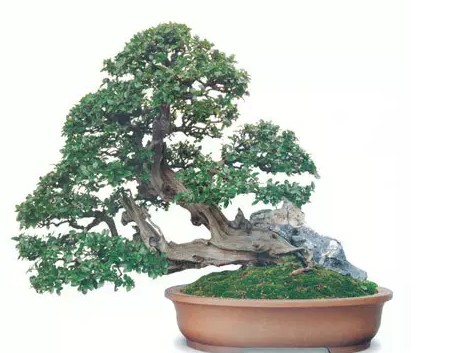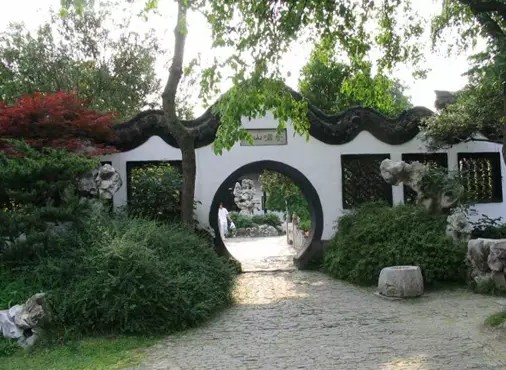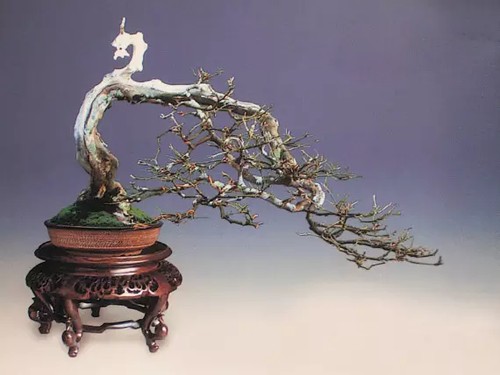Appreciation of Su-style bonsai boutique
"full of ancient spirit":
Tree species: Finch plum height: 57 cm age: about 50 years

It looks like a completely dead stump, and it is artificially carved, clumsy and natural; the tree crown with dense leaves makes you believe that it grows on the back of the dead stump, but there is no doubt about it. The ancient pile is horizontal, with two trunks, one lying horizontally out of the edge of the basin according to the pile body, and the other being raised after being tilted out, the pile type is very individual. The author uses the Lingnan school branch storage technique, the shape has the Su school bonsai characteristic, the knot is natural, the branch is like a cloud, has the layered feeling. The pile shape and crown were inclined to the left, but there was no sign of imbalance. The base of the pile is equipped with a piece of rock, which is mixed with the pile and also plays a balancing role.
Xiongxiu Tiancheng:
Tree species: hammer elm height: 80 cm age: about 100 years
The base of the pile is huge, and there is an irregular cave, which shows the wasted years of more than a hundred years of ups and downs, and nature has created this strange pile scene. The shape of the pile is inclined, and the cave is divided into ordinary universities. according to its shape, the author makes the same oblique shape along the pile potential, which is somewhat handsome and beautiful. In the modeling technique, the author adopts the Lingnan branch-storing technique, which is used in the bonsai plastic art of Su School, which is still hierarchical, natural and unique, which can be described as a successful attempt. Taking a comprehensive view of the whole, the pile is simple and magnificent, and the shape is natural and elegant.
"one branch shows the show":
Tree species: hammer elm height: 78 cm age: about 200 years
The pile is a tree stalk, and it is already a cavity, and the edge of the skin is curled, which is the trace left by its original growth in the rock crevice, the tree body embedded in the rock, and its root neck and its root system exposed topsoil, clumsy and strange. A trunk, is also the only branch rising from the back of the tree, the shape of the branch is also one, its crown is like an umbrella, the "top" is integrated with the branch, and the pavilion is like a lid, which is monotonous and elegant. The original author of this work is Zhu Zi'an, the main founder of Su School bonsai, who shapes according to his talent and highlights the ornamental part of the root neck. The umbrella-shaped twig is actually composed of three or five twigs, that is, the "loose film" technique commonly used by the author. Pile shape and modeling are properly integrated and complement each other, making it a masterpiece of Suzhou bonsai.
Drunken Jade decadent Mountain:
Gold Award of the eighth National Bonsai Exhibition in Yushu
This is a reclining elm bonsai with stretched roots and strong relaxation; the trunk is vigorous and smooth; the branches are distinct but natural. The creator has made great efforts in the bonsai everywhere, and the whole work is dynamic but steady and elegant, and the combination of movement and stillness gives people a sense of beauty. The artistic conception shown in the work is quite appropriate to the name of its "drunken Jade decadent Mountain". Lying drunk without losing its elegance, it is a rare bonsai boutique.
"Green snail Spring":
The Gold Award of the second Yangtze River Delta Bonsai Exhibition
This is a unique and unforgettable bonsai masterpiece. The dense crown and the broad root plate at the bottom form a balance, making the work very stable. But the wonderful thing is that the original sturdy trunk has formed a visual impact due to the appearance of withered holes and smart curves. Rely on the tension of the bark to support the tall crown, vigorous but also appear so elegant, with the beauty of Suzhou gardens, pleasing to the eye.
The Rhyme of the Qin and Han dynasties:
Zhu Zian, Zhu Yongyuan, Suzhou
Tree species: Sabina vulgaris height: 170 box meters, age: about 500 years
Pile slightly oblique, for the only section of dead wood, old, cypress Zhengzheng, it is a true portrayal of hundreds of years of vicissitudes, wind and rain. The right side of the pile all the way "life branch" for its trunk, along the pile, three or five branches Qiu qu freely, branches covered with green hanging green, scaly leaves, full of vitality. Pile foundation a "later branch" lying recumbent, floating out to the right outside, into one; the overall shape is free and easy, full of painting. This pile is simple and magnificent, tall and straight and meaningful, with the potential of Qin Song, Han Bai, and is known as "living cultural relics", "three-dimensional painting" and "national bonsai". Planted in the Dahongpao lotus flowerpot made in the Ming Dynasty, with the relic "Nine Lion Pier" of Zhang Shicheng's horse house at the end of the Yuan Dynasty as the pot seat, the ancient pile, ancient basin and ancient shelf "trinity" has become a rare treasure of Chinese bonsai art.
"Song Song":
Tree species: black pine height: 50 cm age: about 50 years
The trunk is divided into two trunks from the root neck, the trunk recumbent to the right and drooping, showing a semi-cliff type, the secondary trunk and one of the trunk branches grow upward; the epidermis is chapped, the root is raised, the claw-shaped root system is exposed, and the old phase is born. According to the semi-cliff shape of the trunk, the author carries out climbing and shaping, the branches are twisted, the pine needles are clustered, the branches and leaves are evenly distributed, and the tree is full. Dry green, simple, natural shape, free and easy; choose hexagonal deep ladle-shaped pot planting, can better show the tree posture of steep, beautiful, but also the steep cliff, precipitous trend.
"Biyun Yellow leaves":
Tree species: Acer truncatum height: 80 cm age: about 160 years
The pile body is slightly oblique, which seems to be a "big exposure" of the underground part of an old pile; three root veins extend into the soil, and a transverse root (branch) connects with it, forming a leaking hole and gully, and its shape is a little strange. In terms of modeling, the author mainly focuses on the trunk on the left side of the pile. Cut out the branches and layers, the crown is free; another stem, that is, the transverse root (branch) of the pile part, along its horizontal branches, protruding beyond the edge of the basin, reflecting the change of crown width, handled properly. Its pile is quaint and simple, and its shape is natural and decent.
After the frost in late autumn, the leaves turned yellow and turned red. Fan Zhongyan, a famous minister of the Song Dynasty, took the word "Biyun Tian and Huang Ye Di", which means "Biyun Tian, Huang Ye Di", as the name of the scene. We can imagine the charming scenery of autumn.
The second Spring:
Tree species: lobular bone tree height: 82 cm age: about 80 years
The trunk is inclined and then raised, and the dry body is very shaped; the root neck and its underground roots are exposed and embedded, which can be regarded as root-exposed, which undoubtedly adds a clumsy state to the pile. Zhou Lianhe, the author of this work, was originally Daye Gu Gu, which was maintained and managed by his grandson Li Weimin after 1968.
In the mid-1980s, Li Weimin used this pile as a rootstock and used the method of high branch and multi-head grafting to graft the scion of lobular medlar. After more than ten years of meticulous management and styling pruning, it became the status quo. This work maintains the characteristics of Zhou Shengjuan's original work, with uniform distribution of branches and leaves, natural and dignified crown, embellished with red fruit on branches, and more lovely. The meaning of the scene is "the wind and rain still stay in the spring, and there are descendants after the former teacher", which is very appropriate.
"Qike plays the momentum":
Tree species: juniper height: 110 cm age: about 200 years
The ancient rugged, coca peculiar cypress stake has become a "sherry dry", showing the years and vicissitudes of history; the heroic posture of the past is vaguely discernible, but it has become a thing of the past. However, it is the "life branch" on the right side that stretches from the bottom to the top along its withered and luxuriant branches; the umbrella-shaped crown Pavilion female cover carefully bound by the author stands on the top of the "Shili dry" and integrates with it, just like dead wood in the spring. That straight and resolute, natural stretch, vibrant tree posture, compared with its bony cypress stump, seems to be buying its extraordinary demeanor. It is it that turns decay into magic and re-endows cypress with new artistic life and value.
Time: 2019-06-04 Click:
- Prev

See he Yuanyang send bonsai exhibition, enjoy red leaves, smell cinnamon incense
Yangpai bonsai was made in the Tang and Song dynasties. To the Qing Dynasty, Yangzhou widely built gardens, Daxing bonsai, every family had a garden, every household raised bonsai, and formed a school. In 1949, Yangpai bonsai had a further development. In early 1950, Yangzhou transferred 36 pots of pine and cypress bonsai to Zhongnanhai in Beijing
- Next

Su-style bonsai skills
Bonsai skill refers to the bonsai skill of Su School, which originated in the Tang Dynasty, flourished in the Ming Dynasty, matured in the Qing Dynasty and developed in modern times. Since the 1980s, Suzhou bonsai has won many awards in domestic and foreign exhibitions. It was selected into the third batch of national intangible cultural heritage list in 2011.
Related
- Fuxing push coffee new agricultural production and marketing class: lack of small-scale processing plants
- Jujube rice field leisure farm deep ploughing Yilan for five years to create a space for organic food and play
- Nongyu Farm-A trial of organic papaya for brave women with advanced technology
- Four points for attention in the prevention and control of diseases and insect pests of edible fungi
- How to add nutrient solution to Edible Fungi
- Is there any good way to control edible fungus mites?
- Open Inoculation Technology of Edible Fungi
- Is there any clever way to use fertilizer for edible fungus in winter?
- What agents are used to kill the pathogens of edible fungi in the mushroom shed?
- Rapid drying of Edible Fungi

